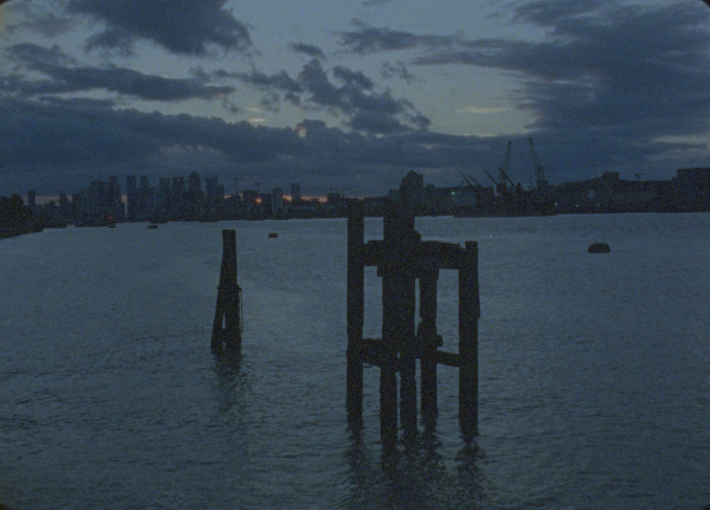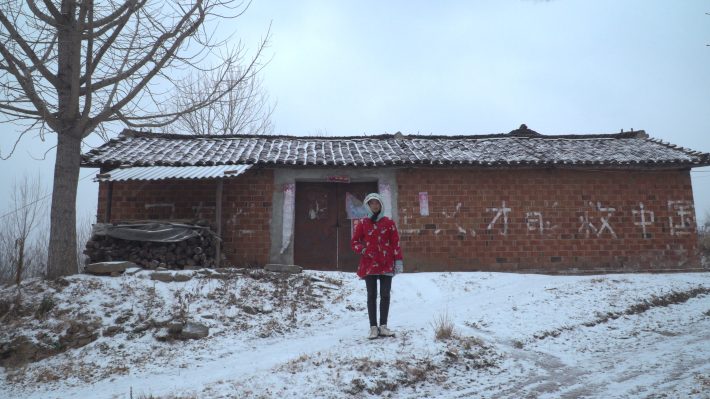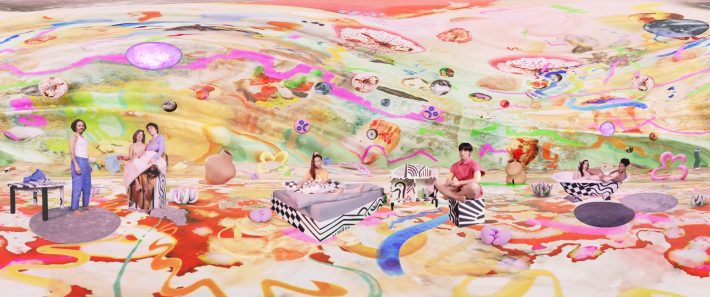Announcing full programme of 2024 Open City Documentary Festival
Open City Documentary Festival is excited to announce the full programme for its fourteenth edition, taking place in person from 24th to 30th April. The festival welcomes returning and new audiences to venues Barbican, Bertha DocHouse, Close-Up Film Centre, Genesis Cinema, Institute of Contemporary Arts, LUX, Tate Modern and Rich Mix, where the Festival Hub will be based.
Open City Documentary Festival 2024 will celebrate the art of non-fiction with 161 films and 5 Expanded Realities projects. The new film programme includes 4 World Premieres, 14 UK Premieres, and 6 London Premieres, and films from 35 different countries. Works by women or non-binary filmmakers and artists make up 67% of the programme.
Opening and Closing Nights

The 14th edition opens with the premiere of Sunless Haven (George Clark, 2024), a film which re-imagines the experiences in, around and through the London Docklands at the turn of the 20th century. The screening will be accompanied by a selection of 35mm reels from Clark’s ongoing project Eyemo Rolls and works by other artists.
The festival will close with a new digital restoration of Heiny Srour’s Leila and the Wolves (1984), co–presented with Cinenova. The film reveals a hidden past of women’s struggle in Palestine and Lebanon in an attempt to rewrite the history of the region from a feminist point of view.
Wider Film Programme
Open City Documentary Festival will present two In Focus programmes with returning filmmakers Simon Liu and Jessica Sarah Rinland. Folk Memory Project: Between Autoethnography and Anti-ethnography, curated by Hyun Jin Cho, presents a selection of works produced through the ongoing collective filmmaking initiative that, since 2010, has been documenting personal histories of the Great Famine of 1959 – 1961 in China. Curated by Elena Gorfinkel, Grandma’s Grammar is a programme that traces the persistence of the figure of the grandmother as locus of feminist historicity in non-fiction film, considering the grandmother as cinematic medium and privileged subject for modelling alternative modes of storytelling, inter-generational genealogies, and archives of memory and lived experience.
Personal stories that focus on ancestry, history and familial connections are prominent in this edition. Daniel Jacoby’s 315 (2024) narrates a series of historical events that have occurred, over the years, on his birthday, the 31st May. Artistes en Zone Troublés (2023) is also comprised of personal video footage shot by Lionel Soukaz in the early 1990s and edited by Stéphane Gérard to form a 38-minute eulogy for, and celebration of, Soukaz’s partner, the artist Hervé Couergou. Afterthoughts of a Walk on the Naze (2023) by Louis Henderson attempts to decipher a painting made by his great-uncle, Nigel Henderson, who wrote a letter addressed to the filmmaker’s future self.
The combined programme Becoming Landscape includes Eva Giolo’s 2023 titular film, a portrait of Fogo Island, off the Eastern coast of Canada. Giolo approaches the unique environment of the island – human, geological, floral – proposing an indivisibility between landscapes and the bodies that inhabit them. Public Surfaces (Gillian Waldo, 2023) revisits the resultant sculptures and installations of a 1964 law passed in Baltimore stipulating that for any new building in the city, 1% of its construction budget had to go towards commissioning a new piece of public art. Hicham Gardaf’s In Praise of Slowness (2023) is an alluring study of Moroccan street hawkers, whilst Slow Shift (Shambhavi Kaul, 2023) concentrates on geological, animal and human timescales in Hampi, India.

Palestinian militant cinema and its centrality to the struggle for Palestinian liberation is explored in a series of programmes and talks curated by Saeed Taji Farouky. The programme OF THE PEOPLE, FOR THE PEOPLE: MILITANT PALESTINIAN CINEMA (1968-1982) is centred around the iconic 1974 film They Do Not Exist and includes a recently restored Jocelyne Saab’s Palestinian Women, (1974), and the timely 1973 Scenes of the Occupation from Gaza (Mustafa Abu Ali). THE NEW MILITANTS brings together for the first time contemporary work from Palestinian filmmakers, and their international allies, who have inherited the legacy of Palestine’s original militant cinema movement. Elsewhere in the programme, Razan AlSalah’s A Stone’s Throw (2023) unravels the recurring violence of oil and labour extraction through the story of displacement of a twice-exiled Palestinian elder.
Curated by Sophia Satchell-Baeza, Falling Lessons: The Films of Amy Halpern comprises two programmes of the filmmaker’s rich and associative films. A series of short films made over three decades, almost all on 16mm, and her only feature-length film, the monumental Falling Lessons will be presented here for the first time in the UK.
Four key works of Nicolás Guillén Landrián will screen at the Barbican showcasing his most creative period from the early to late 1960s. The programme Nicolás Guillén Landrián: A Gaze Restored, curated by Jonathan Ali, also features Landrián (Ernesto Daranas Serrano, 2023) a reflective documentary on the Cuban filmmaker.
Pablo Álvarez-Mesa returns to the festival with The Soldier’s Lagoon (La Laguna del Soldado, 2024) the second part of his trilogy of films retracing Simón Bolívar’s passage during the Liberation Campaign of Columbia in 1819. Ann Carolin Renninger, James Edmonds, Luke Fowler, Maria Anastassiou, Miranda Pennell, Niki Kohandel, and Tiffany Sia also return with new works. Filmmakers screening at the festival for the first time include Annik Leroy & Julie Morel, Aura Satz, Beatrice Gibson, Deborah Stratman, Kaori Oda, Khaled Abdulwahed, Lucy Harris, Mary Jirmanus-Saba, and yann beauvais.
Losing Home: Expanded Realities

This year’s exhibition features five non-fiction works which use moving image practices in the broadest sense of the term to address the sensation of alienation from a domestic environment. These works allow viewers to inhabit bodies, relationships and built environments which have, each in their own way, come to feel like home and which have since been transformed into hostile and unfamiliar spaces.
Talks and Workshops
In partnership with Artists for Palestine UK, Film in solidarity with Palestine aims to share knowledge and models of practice with a view to connecting film workers who want to be part of a transformative movement for collective liberation.
Stolen Films Imaginary and Kanafani Karaoke have been conceived by filmmaker Saeed Taji Farouky as an extension of the screening programmes OF THE PEOPLE, FOR THE PEOPLE: MILITANT PALESTINIAN CINEMA and THE NEW MILITANTS. Saeed Taji Farouky: Soon We Will All Be History Here vol. II is a spatial performance lecture that examines Palestinian political cinemas as a form of resistance.
Accompanying the film screenings, In the Name of Memory will be a lecture performance reflecting on Zhang Mengqi’s complex relationship with her father’s village, 47 km, as well as highlighting the evolution of the Folk Memory Project. In Body Workshop participants will be guided by Zhang Mengqi & Ang Gao to explore their bodies as the first moment of remembering and to realise their potential to become living archives.
Hosted by T A P E Collective the sessions Meet Your Producer and Meet the Exhibitors will allow attendees to speak and discuss projects with producers, exhibitors and industry professionals. In Long Visions: Paths to First Features we invite all artists interested in or on their way to developing a first non-fiction feature to join the Head of the BFI Doc Society Fund Luke Moody for this roundtable discussion.
Printed Forms: Publishing and Experimental Moving Image will bring together the writers and publishers of recent publications devoted to experimental cinema.
Returning to the festival are The New Black Film Collective with London’s Screen Archives with Undocumented, a session that will delve into absence and representation in London’s moving image archive collections, and the Filmmaker meetups of London, which aim to provide a chance to hang out, meet other artists and gossip about cameras, image making, potential collaborations, favourite art works and more in a relaxed and supportive environment.
